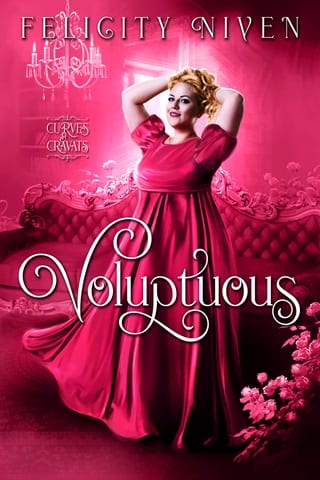Chapter 11
Eleven
April. 1818.
H enrietta had been married for almost eight months now. Two-thirds of a year.
She had learned many things about her husband in that time. He was widely considered to be a diligent and fair man, kind to his workers and helpful to his tenants. He read a newspaper in the evening after dinner. He still liked Mrs. Blaire's custard, even though Henrietta was the one cooking it now. He was making a map of the Lake District, and not a dull, dry one, but a charming one, full of all kinds of cunning little drawings.
He always smelled good to her, even when his work had involved some hard labor that day and he had just come into the house, greeting her on the stairs, brushing by her on his way to his wash. He might have had to deal with some farming unpleasantness, but there was some essential rightness to his own smell that overcame any stench.
Oh, and he had beautiful hands and wrists and arms. She had spent many hours observing his hands—his long palms topped by his strong yet elegant fingers, holding his newspaper, wielding his knife and fork—but only last month, she had gotten her first look at his forearms.
She had decided to take Nathaniel out in the dog cart to observe the sheep shearing. All the men had taken off their coats and rolled up their sleeves, but it was Oliver's forearms that had heated her body and made a trickle of sweat course between her breasts on the cold March morning.
That span from Oliver's elbow to his hand was long, of course, like all the rest of him, but also ropy with muscle and sinew and branching veins when he lifted a ewe. A sparse mat of dark hair on the outside and golden skin on the inside.
Henrietta didn't think it was wifely to pine, but she let herself shed a few tears of longing for those forearms when she was alone in her bed that night.
But the most important thing she had learned about her husband was that he loved his son. He did. Somehow, sometime in the past, Oliver had let himself get all foolishly twisted up in his thoughts and actions and emotions. In the midst of pushing away those big feelings he thought he could not tolerate, he'd also pushed away his son. Henrietta didn't know why Oliver had believed he wasn't strong enough before, but now he had found the belief or the strength from somewhere.
Because much of what had been wrong between father and son had come right in the last several months.
This winter, Oliver had devoted time and care and attention to Nathaniel. The two had played together and read together and even occasionally napped together on a sofa in the drawing room, Nathaniel's dark head tucked into his father's chest as Oliver's arm curled around his son protectively.
There was nothing that made her happier than witnessing that growing closeness.
Except, perhaps, if something similar might happen between herself and Oliver?
He was unfailingly kind to her. He trusted her with everything in the house, despite her youth and inexperience. He had allowed her to take charge of Nathaniel's food, his sleep, his simple lessons.
And he had, unexpectedly, given her the most marvelous, romantic Christmas gifts, ones that hinted at an intimacy between them that did not exist.
Rose-scented perfume. A reference to where they had become betrothed?
Yards of blue muslin in the exact shade of her eyes.
A bolt of pink taffeta. The month before Christmas, she had mentioned she loved pink, but never wore the color because a London modiste had told her she couldn't. The redness of her hair was to blame. And when she had torn the wrappings from the bolt on Christmas morning, Oliver had said stiffly, "You should wear what pleases you. And I think you would look very well in any color."
And silk stockings. Silk stockings! From a man who had never seen her legs, let alone touched them.
He tolerated her affection—her hand grabbing his, her hugs, her kisses atop his head when he was seated or on his cheek when he was standing and she went up on her toes. She bestowed all the same caresses on him that she gave to Nathaniel or she would give to members of her family.
But he never reached for her.
Never.
She had never spoken to anyone, not even her mother, about her secret shame. Her husband did not want her in his bed, and he did not want to come into her bed.
He never spoke of his previous wives, so she knew almost nothing about them beyond the painting of the beautiful, fragile Emily. Henrietta never allowed gossip to be repeated in front of her. Her lady's maid had tried to tell her some of the below-stairs talk, but Henrietta had hushed her immediately, saying, "If my husband wants me to know something, he'll tell me himself, Lucy."
She had dared to ask Oliver one or two questions about her predecessors, but she could see with her own eyes he didn't like to talk of the past and his losses, so she stopped asking. After all, she was trying to make him happy, not sad. Much better to tell him how Nathaniel had learned his numbers up to one hundred because he wanted to draw a centipede or to laugh over Oliver's stories about the one wily ram who always left his fellow rams to invade the ewes' pasture or to repeat the family news contained in her most recent letter from Bexton Manor.
She also stopped asking questions about the previous Mrs. Hartwells because, as the months went by, she discovered certain things about herself.
First, she was a coward and didn't want to hear about the women Oliver had chosen. Women he had married of his own volition and lain with.
Second, she was a horribly jealous, petty thing.
Third, she was in love with her husband and she wished desperately, more than anything, that he would be in love with her, too.
 Fullepub
Fullepub 



